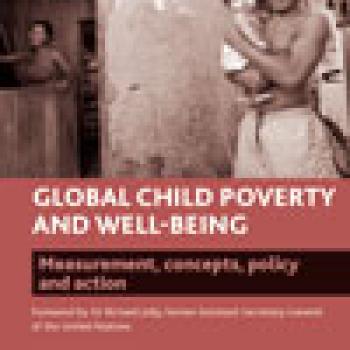Publication Information

CHECKING
In this chapter our aim is to provide an overview of Young Lives and of its emergent findings. Young Lives is a longitudinal study of childhood poverty in four developing countries - Ethiopia, India (Andhra Pradesh), Peru and Vietnam - which was set up in 2001 with two principle aims: to improve understanding of the causes and consequences of childhood poverty and to inform the development and implementation of future policies and practices that will reduce childhood poverty. The study countries were chosen to reflect a wide range of cultural, economic, geographical, political and social conditions, the intent being to explore similar challenges in diverse contexts. The challenges include high debt burden, post-conflict reconstruction (except in India) and volatile environmental conditions with recurring drought and flooding in many areas. As it happens, all four countries have experienced consistent economic growth since Young Lives was established. However, as we know from developed contexts, economic growth does not equate to the eradication of poverty. There are persistently high levels of social and economic inequality in India and Peru, and this is also an emerging concern in Vietnam, associated with rapid levels of growth in recent years. What this means is that Young Lives is able to study transforming economies in which poverty has become entrenched. In contrast, poverty levels remain high throughout Ethiopia, even with recent growth, and levels of inequality are less marked. This contrast offers an opportunity to consider causes for continuity and change in poverty situations for Young Lives children.
ReferenceJo Boyden, Abby Hardgrove and Caroline Knowles (2012) ' Continuity and Change in Poor Children's Lives: Evidence from Young Lives', in Alberto Minujin and Shailen Nandy (eds) Global Child Poverty and Well-being: Measurement, Concepts, Policy and Action (pp. 475-506). Bristol: Policy Press.

CHECKING
In this chapter our aim is to provide an overview of Young Lives and of its emergent findings. Young Lives is a longitudinal study of childhood poverty in four developing countries - Ethiopia, India (Andhra Pradesh), Peru and Vietnam - which was set up in 2001 with two principle aims: to improve understanding of the causes and consequences of childhood poverty and to inform the development and implementation of future policies and practices that will reduce childhood poverty. The study countries were chosen to reflect a wide range of cultural, economic, geographical, political and social conditions, the intent being to explore similar challenges in diverse contexts. The challenges include high debt burden, post-conflict reconstruction (except in India) and volatile environmental conditions with recurring drought and flooding in many areas. As it happens, all four countries have experienced consistent economic growth since Young Lives was established. However, as we know from developed contexts, economic growth does not equate to the eradication of poverty. There are persistently high levels of social and economic inequality in India and Peru, and this is also an emerging concern in Vietnam, associated with rapid levels of growth in recent years. What this means is that Young Lives is able to study transforming economies in which poverty has become entrenched. In contrast, poverty levels remain high throughout Ethiopia, even with recent growth, and levels of inequality are less marked. This contrast offers an opportunity to consider causes for continuity and change in poverty situations for Young Lives children.
ReferenceJo Boyden, Abby Hardgrove and Caroline Knowles (2012) ' Continuity and Change in Poor Children's Lives: Evidence from Young Lives', in Alberto Minujin and Shailen Nandy (eds) Global Child Poverty and Well-being: Measurement, Concepts, Policy and Action (pp. 475-506). Bristol: Policy Press.

